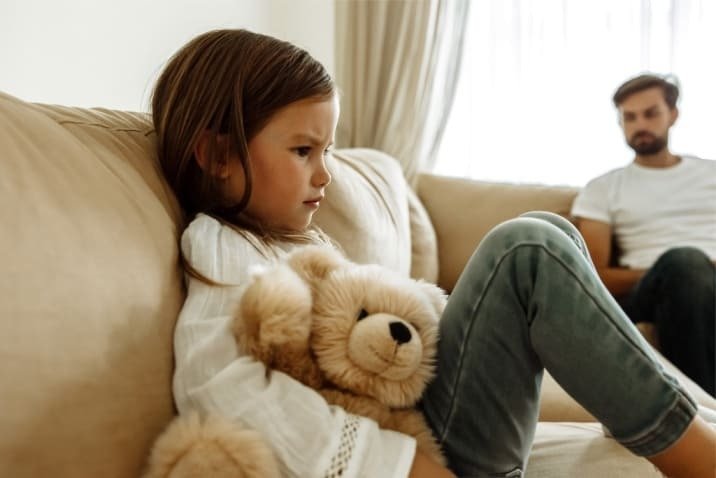14 Reasons Why Kids Misbehave

Source:https://messyyetlovely.com/
Children, much like adults, have a fundamental need to feel like they belong and are significant. When they lack this sense of belonging, they may misbehave as a reaction. Simply repeating instructions or discipline is often ineffective and can be detrimental. Instead, it’s important to explore the underlying causes of their behavior to better understand and address their needs.
So here are some common reasons why kids misbehave and how to decode their behavior:
1. KIDS MISBEHAVE WHEN THEY DON’T FEEL BELONGING: Children need to feel a sense of belonging within their families, as it is essential for their well-being and personality development. When they feel included, they thrive, expressing themselves freely and feeling safe. Conversely, a lack of belonging can lead to feelings of loneliness, prompting them to express despair, such as wishing they were never born. Such statements may indicate a need for more love and attention. Without this connection, children may seek belonging in other communities, potentially leading to negative behaviors or addictions as a way to cope with their feelings of injustice and rejection.
WAYS TO PROVIDE A SENSE OF BELONGING IN CHILDREN:
- Let them know how much you love them using positive words of affirmation and physical touch on a daily basis
- Ask for their opinions on simple matters like what to make for dinner
- Give them space to express their emotions
- Let them know you have their back even when they make mistakes. Earn their trust by reacting to them positively when they make mistakes.
- Listen to them without judgment and offer empathy. This is one of the important skills we can learn s parents as it helps kids to feel seen and heard.
- Spend at least 10 minutes with them every day to create connection time
2. THEY FEEL POWERLESS: Children misbehave when they feel powerless, as all individuals need a sense of autonomy to develop their identity. Lacking positive avenues for empowerment, they may resort to negative behaviors like backtalking, tantrums, and whining to assert themselves.
WAYS TO GIVE KIDS APPROPRIATE POWER:
- Give them choices (that you can stand with) Assign age-appropriate chores
- Never do for them what they can do on their own
- If they show interest in doing something, let them do it no matter how messy their work is
- Give space for failures and encourage to try again
3. KIDS ACT OUT WHEN THEIR PHYSICAL NEEDS ARE NOT MET: Children’s physical needs, such as proper nutrition and adequate sleep, are essential for their well-being. Lack of sleep can lead to irritability, forgetfulness, and impulsivity, while hunger can result in anger, hyperactivity, and aggression. Just like adults, children have low tolerance when these basic needs aren’t met. Therefore, it’s important for caregivers to assess and address any unmet needs before addressing misbehavior.
4. THEY HAVE HAD SUCCESS PURSUING NEGATIVE BEHAVIORS: Children often test boundaries to see how far they can push to get what they want, using tactics like whining or throwing tantrums. If these behaviors have previously worked, kids will continue to use them. It’s crucial to stop rewarding such behaviors by giving in, even though it may be difficult initially. Consistency is key; once children realize they won’t get the desired response, the behavior will likely diminish. A helpful technique is Amy McCready’s “Asked and answered,” which signals that the discussion is over and reinforces the idea that there’s no room for negotiation.
5. YOU HAVE HIGH EXPECTATIONS:Having high, age-inappropriate expectations for children can lead to difficulties in maintaining good behavior. If kids are expected to share constantly, sit still for long periods, or suppress their emotions, it can be overwhelming for them. They often lack the social skills and emotional control to manage their feelings, leading to behaviors like hitting or throwing toys when frustrated. Instead of punishing these reactions, it’s more effective to teach them appropriate responses through role modeling. The goal should not be to have perfectly behaved children but to address the underlying causes of their misbehavior.
6. YOU DON’T IMPLEMENT CONSEQUENCES CONSISTENTLY: Consistent consequences help children understand the effects of their behavior and discourage misbehavior. It’s important to follow through on these consequences, regardless of how much they might nag. Additionally, all caregivers at home should agree on rules and how to enforce consequences. If children see inconsistencies, like getting what they want from someone like Grandma, they may try to exploit those gaps in discipline.
7. THEY ARE BORED: Misbehavior in children can often stem from boredom, as they may not know how to use their free time constructively. While it’s impractical to entertain kids constantly, it’s important to encourage them to learn self-entertainment. Creating a list of creative and constructive activities can help. When misbehavior occurs, reminding them of this list can redirect their energy and reduce irritability.
8. THEY HAVE TOO MUCH SCREEN TIME: Excessive screen time has been linked to behavior problems in children. A study from the University of Alberta found that five-year-olds who spent two or more hours daily on screens were significantly more likely to show symptoms of ADHD, such as hyperactivity and inattention. Observations from parents indicate that too much screen time can lead to increased aggression and impatience. Reducing screen time and promoting constructive activities, especially outdoor play, can help improve children’s behavior and foster a more positive mindset.
9. THEY ARE BECOMING INDEPENDENT: As children develop a sense of individuality, they seek to assert their independence in various ways. Expecting complete obedience can lead to power struggles, as they test boundaries to establish their autonomy. Instead of labeling their behavior as misbehavior, it’s beneficial to understand their perspective and support their decision-making. Allowing children to make harmless choices, like what to wear or eat, fosters a sense of control, leading to better cooperation. When they feel respected and have some independence, they are less likely to misbehave.
10. THEY DO NOT UNDERSTAND: Children may seem disobedient, but often they simply do not understand instructions, especially if multiple tasks are given at once. Their prefrontal cortex is still developing, making it challenging for them to follow complex directions. Instead of quickly labeling their behavior as disobedience, it’s helpful to ask them to repeat your request to gauge their understanding. This can reveal if they’ve only grasped part of the instructions or need further clarification. Engaging with them through questions and demonstrating tasks can bridge communication gaps and ensure they comprehend your directions.
11. THEY ARE IN BAD COMPANY: Children are adept at imitating behaviors, including misbehavior learned from others. It’s essential to monitor what shows they watch and who they associate with, as exposure to inappropriate content can promote aggression. Teaching healthy emotional expression and politeness is crucial, as children often mirror their parents’ behaviors. If adults struggle with anger management or use physical discipline, kids may adopt these negative behaviors as well. Therefore, assessing and improving our own actions is vital to setting a positive example for children.
12. YOU HAVE A NAGGING HABIT: If kids seem unresponsive after repeated instructions, it may be because they’ve tuned out due to constant nagging. This can lead to ongoing misbehavior. Instead of lecturing, it’s important to explore more effective communication methods to engage children and improve their listening skills.
13. THEY FEEL UNAPPRECIATED: Constant criticism can lead to misbehavior in children, as they may feel a lack of attention and appreciation. This creates a cycle where negative behaviors emerge from a desire for attention, even if it’s negative. Children thrive on positive reinforcement, so it’s essential to encourage good behavior while minimizing criticism. Engaging with them genuinely can foster more positive behavior, as they generally want to please those they love.
14. UNDERLYING MENTAL HEALTH PROBLEMS: Children with ADHD, anxiety, or depression may display misbehavior due to their conditions. ADHD can lead to impulsive behavior and difficulty following instructions. Anxiety might cause avoidance of certain situations, resulting in unresponsive behavior triggered by the fight, flight, or freeze response. Depression can diminish motivation, affecting their willingness to complete tasks. If any symptoms of mental health issues are observed, it’s important to consult a pediatrician for appropriate treatment.
Read More: https://childreninfobank.com/safebank/14-reasons-why-kids-misbehave/
Image Source: https://messyyetlovely.com/





